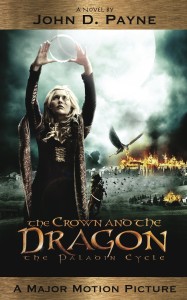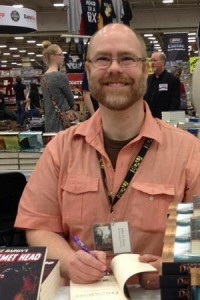Let me start off with the caveat that I am not an expert merchandiser. Everything I’m going to talk about below comes from a few years of hand-selling my books at conventions. I know people who can do this immensely better than I can. I’ve seen them selling scores of books like veritable sales machines. For me, however… well, one can only push a natural introvert so far.
Nevertheless, my aim here is to offer a few basic building blocks for those who are just starting out. Hopefully these tips will let you meet people and sell books at conventions without coming across Joe Obnoxio, Desperate N00B.
I’ve been selling books actively at conventions for about the last six years, starting with the release of Heart of the Ronin in 2009. Since then, three more novels have come out from various publishers. I’ve also landed short stories in a number of anthologies, which I also I sell at tables and in booths in the exhibitor halls. I’ve sold at cons of every size, from a scant couple hundred to massive mega-cons like Dragon Con and Denver Comic Con. The point is not to give you a writing resume, but to say that hand-selling at conventions gets easier not only with experience, but also with more titles on your table, offering opportunities to appeal to different tastes.
Get on programming. The most efficient way to reach the greatest number of potential readers is to participate in programming. Target some conventions that you plan to attend. Their websites always have contact information for the programming organizer(s). Unless the convention is DragonCon or GenCon, which are both overwhelmed by programming requests, they are actively looking for professionals to sit on panels.
Did you see that keyword I slipped in there? Professionals. Behaving as a professional at all times goes a long way. Even if you don’t feel like one with only one novel or a couple of short stories, you can behave like one. Fake it till you make it. For more information on this, check out Million Dollar Professionalism for Writers, by Kevin J. Anderson and Rebecca Moesta.
When you’re on the panel:
- Be prepared.
- Be erudite.
- Be engaging.
- Talk more about the other authors’ books. Writers who talk incessantly about their own stuff risk coming across as an egotistical jackass.
If you pull this off, the audience will recognize it, and some of them will seek you out after the panel to ask questions, which is the perfect time to tell them you have a booth/table where you’re selling your books.
Cooperate with other authors. Buying booths or tables at the massive conventions like DragonCon is cost-prohibitive, where costs for a booth run into the thousands of dollars. When you split those costs with fellow authors, however, the fees become much more reasonable.
The cost of a $3,000 booth split ten ways is a bargain when you consider that 80,000 fans with red-hot money in their pockets will filter past over the course of a four-day weekend.
So round up some of your author friends, form some sort of collective, and take a convention by storm.
Engage the potential readers one at a time. So when you have a potential new reader in front of you, what is an effective way to sell books? It is not to shove the book in her hand and say, “Buy this.”
- Talk about the reader first. Engage them in conversation about the convention. Is she enjoying herself? The longer you talk to someone, the more likely he/she is to walk away with one of your books.
- Ask if he/she is a reader. If it’s obvious she is, then skip this and ask what kind of books she likes. Nearly always, the response is so general that it’s not useful. “Science fiction and fantasy.” Your job then is to help her narrow it down. Urban fantasy? Military SF? Literary? Who has she been reading? What are her favorites?
- The aim here is to steer her toward a book of yours that is aligned with her tastes. She’ll appreciate your thoughtfulness. And if there’s no chance of connection at all—she reads romance and you write horror—you’ll both know sooner, and she can go on her way, further appreciating that you didn’t waste her time.
- In advance, create a one- or two-sentence sales pitch for each of your books, something that summarizes it in a nutshell. Make it as snappy as possible. When you have identified which of your books the potential reader might enjoy, give her your sales pitch.
- If you’re selling in a booth with other authors, this could be also a chance to talk up your companions’ books. Maybe you lost a sale for yourself, but your friend will certainly appreciate it.
If you really want to build your sales skills, read a book or two on the subject of how to steer people into giving you their money. There is a tried and true structure to it, honed over decades of snake oil salesmen.
Once you’ve learned the method, the next thing you need is practice. Get out there and do it. Sometimes you’ll succeed and both the reader and you will walk away with that rosy glow of success. Often they will walk away, and your only choice is to wait for the next one to come along. Take what you learned from previous miss, adjust, and then do it all over again.
Don’t be a dick. Be gracious. Be friendly. Be humble. Just listen to the horror stories about how William Shatner or Harlan Ellison behaved on a bad day toward a fan for lessons in what not to do. If you’re reading this, you probably have not yet reached the literary stature of Harlan Ellison, so you cannot afford many social faux pas. A single, disgruntled fan in the age of the internet can truly hurt a budding career.
Final thoughts. The thing to remember is that competitiveness in this business is the chief signpost on the road to Crazy Land. You’ll make yourself miserable if you worry about how much you’re selling/not selling, comparing yourself to others. There are too many other opportunities for writers to make themselves miserable without jumping onto this one.
It is highly unlikely that you will sell enough books at a convention to cover your costs, so don’t get too caught up in that. Aside from the mental health aspect of meeting/hanging out with fellow writers, the main benefit is that you’ve made some personal connections with new readers, who are then more likely to become the kind of fans who will sustain your career in the long-term. They’ll come back next year to see if your next book is out.
And when you see the joy in their faces that they have, in fact, found this cool author they met last year, that expression is worth the cost of any convention to a writer’s soul.
About the Author: Travis Heermann

 Travis Heermann’s novel Spirit of the Ronin, will be published in June, 2015.
Travis Heermann’s novel Spirit of the Ronin, will be published in June, 2015.
Freelance writer, novelist, award-winning screenwriter, editor, poker player, poet, biker, roustabout, he is a graduate of the Odyssey Writing Workshop and the author of Death Wind, The Ronin Trilogy, The Wild Boys, and Rogues of the Black Fury, plus short fiction pieces in anthologies and magazines such as Perihelion SF, Fiction River, Historical Lovecraft, and Cemetery Dance’s Shivers VII. As a freelance writer, he has produced a metric ton of role-playing game work both in print and online, including the Firefly Roleplaying Game, Legend of Five Rings, d20 System, and the science fiction MMORPG, EVE Online.
In 2015, he’s moving to New Zealand with a couple of lovely ladies and a burning desire to claim Hobbiton as his own.
You can find him on…










